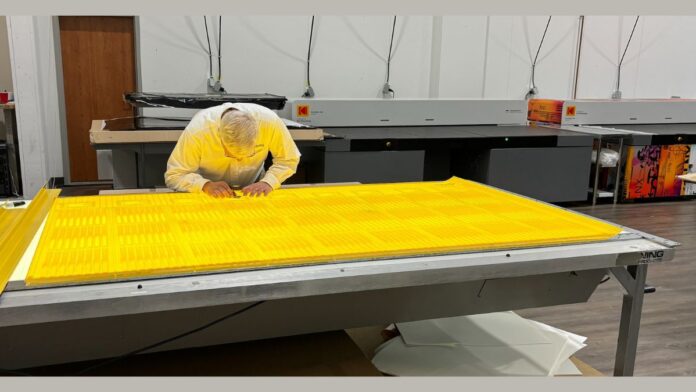Flexographic packaging trade shop and early technology adopter Pacificolor is reaping significant production and sustainability benefits after upgrading from fluorescent exposure to LED technology with a Shine LED Lamp Kit, innovated by Miraclon.
The Shine LED Lamp Kit is notable as a simple, low-cost route to the multiple benefits of LED exposure, necessitating just a straightforward, fast, retrofit upgrade to existing fluorescent exposure frames.

“We’re experiencing faster, more consistent plate exposure times and reduced maintenance. These add up to greatly enhanced productivity in the plate room across the group for a fraction of the cost of alternative routes into LED. In addition, and important from the sustainability perspective, it’s all achieved by ‘upcycling’ our existing equipment.” says Nick Brunk, Pacificolor’s Chief Revenue Officer:
The advantages of LED
LED lamps offer significant advantages over fluorescent tubes. They last longer — 5000 hours compared to 800 hours — and do not degrade: intensity remains consistent over time, lamp to lamp and throughout each individual lamp. LED technology also increases productivity: exposures are not only consistent but up to 20% faster, because the lamps warm up and cool down instantly. Sustainability is enhanced due to reduced waste, lower power consumption and lower disposal costs.
Successful beta testing
Approached by Miraclon to evaluate the Shine LED Lamp Kit, Pacificolor did not hesitate to act as a beta site. Nick states: “Fluorescent exposure technology is on the way out, and the tide has turned in favour of LED. Beta testing gave us the opportunity to confirm our instincts and prove the benefits of LED. Routine measurement of UV output showed no fluctuation in the power the LEDs were putting out.”
Tim Hirsch, Owner and CEO of Pacificolor, has an equally positive take on the benefits of

the Shine LED Kit: “The installation of Shine LED has proven to be exceptionally straightforward, seamlessly integrating into our production processes. It has emerged as our preferred exposure solution, primarily due to the notable enhancements it has brought to plate uniformity and efficiency. By adopting Shine LED, we’ve successfully eliminated the variables associated with fluorescent UV tubes, resulting in consistency across every plate. Our operators have expressed their satisfaction with this change, as they no longer have to wait for lamps to warm up, and the change in exposure times, leading to an overall improvement in productivity within our plate room.”
Staying ahead of technology
Keeping ahead of technology is a top priority for Pacificolor. The company was an early adopter of FLEXCEL NX Technology from Miraclon, and — to meet the demands of a growing client base — has successively upgraded imaging formats from narrow- to mid- and now wide-web. Pacificolor has also quickly leveraged the latest imaging technologies, including PureFlexo™ Printing, the most advanced iteration of advanced plate surface patterning technology from Miraclon, and screening technologies ProjectBlue® and VORTEXTM, developed by our partners Reproflex3, based in the UK. Switching to LED exposure is in line with what Nick calls “doing our technology due diligence.” He continues: “This confirmed the shortcomings of fluorescent tube exposure technology, principally the consequences of tubes degrading over time, and at different rates. The resulting risk of inconsistent exposure means we spend a lot of time on process control and maintenance to avoid poorly exposed plates and remakes.”
He adds that the diverse range of work Pacificolor handles calls for even greater quality control. “Between flexible packaging and corrugated, we’re exposing a variety of different reliefs, some deeper than others. Getting consistent fluorescent exposures means following a stringent process to make sure you’re getting the power from the bulbs that you need. This can mean significant downtime.”












